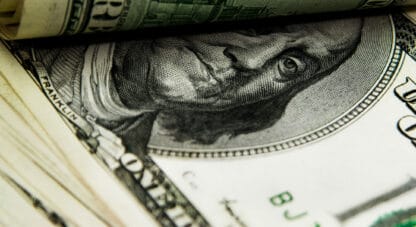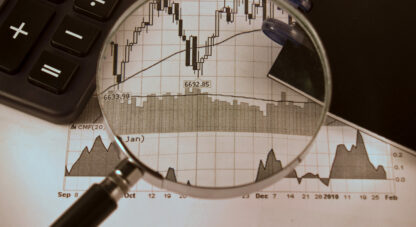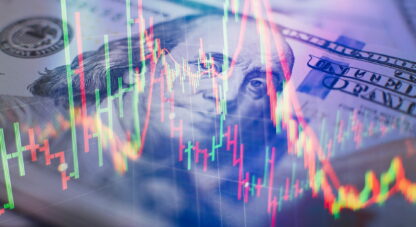About this week’s show:
- The attempt to re-create the Caliphate
- 1,400 years of tension between Sunni & Shiite
- Gold in Fort Knox, is it a just a fairy tale?
The McAlvany Weekly Commentary
with David McAlvany and Kevin Orrick
Kevin: I’m so excited, David, for the conversation that you are about to have with Chuck Missler. He is near and dear to many of our hearts. I know he is near and dear to your father’s heart. This is a guy who, if something is happening worldwide, you want to talk to him. But he is so humble. He never comes across as the only expert in the room. And I just love that about Chuck.
David: He is an engineer. He likes taking things apart, tinkering, and looking at the details, disassembling and then putting back together, and if it can be improved, then improve upon it. The unique thing, I think, as I grew up, there was the discussion of the spheres of knowledge, the sociopolitical, the financial and economic, the moral and the spiritual, and the case that Don always tried to make in the home was that there is an interconnectedness between these spheres, and there can even be a knock-on effect, something deteriorating or changing, or bending, in one sphere, and having a profound impact on another.
Kevin: That’s hard on engineers. Engineers really like to isolate things so they have very few variables, but in reality, it’s an integrated system, isn’t it?
David: Unless you like complexity theory. (laughter) One of the things that I really enjoy about Chuck is that he is so integrated in his interests. He is interested in history, he is interested in – you name it. There is virtually no category that he hasn’t done, not just a cursory read, but very deep reading in, and so his opinions are very broad, but also very deep, and he does tie them out to what he considers foundational truth in the moral and spiritual spheres, so it’s familiar to me. It’s what I was raised with.
Today we want to talk about a number of things. We want to talk about the Middle East. We want to talk about, certainly, the U.S. economy. We want to talk about changing trends. Chuck is just back from Israel, and there is a lot developing and changing there, as well. He will bring both a historical perspective, and live, if you will, from the Middle East, although he has just returned to New Zealand from the Middle East. He has some fresh perspectives from that, too.
Kevin: David, you have familiarity, I have familiarity, but maybe our listeners don’t, so if you could give just a little bit of an overview before you start talking with Chuck about his background.
David: You can imagine, he was in the era where there were a few guys, tinkering in the garage and building computers, and this is before there were computers so it’s Bill Gates doing this or that, and fill in the blanks, there are probably 3-4 dozen men that you can think about who just loved electronics. That’s what he was studying, actually pursuing a doctorate in electrical engineering at Stanford. Then, moved from there, did not finish his doctorate at Stanford, moved from there to the United States Naval Academy, graduated with honors, went into the Air Force, then got involved in the guided missile program with the Department of Defense. And then you have his senior track, if you will, as an engineer with TRW, an aerospace defense contractor. Then he goes from there to working with Ford Motor Company in senior management there. And then from there to computers. Again, we’re talking about high analytical skills, and whatever he is putting his mind to, it’s high analytical skills.
Kevin: I remember having dinner with him one time, and he’s probably not going to admit to this, but remember when Al Gore said that he invented the internet. Al didn’t, but actually, Chuck was with the military when they were developing the internet, and he explained to me one night that it was actually to spread the defenses out so that it couldn’t be attacked in one single source, and I know he was part of that.
David: (laughter) It’s fascinating. Welcome Chuck from New Zealand. I sat at a lunch table years ago with William Dembski and Phillip E. Johnson, and we were discussing apologetics, we were discussing Christianity and culture. Dembski is a gifted scientist, and Johnson was, at the time, still a law professor at U.C. Berkeley. Johnson said, as I recall, “I read a paper every day and I always find something relevant to draw into my lectures, my presentations. I try to open every lecture with something off the front page in the morning newspaper.” That’s what he mentioned at this table. Chuck, you and I share a common passion for ideas. We also track current events, and we see many of the same connections and trends, which frankly, might be missed by the casual observer, and I have to say, I would guess that we both read more than one paper a day. Obviously our focus, McAlvany Financial Group, takes us to the implications in the world of finance and economics, with a unique focus on gold, silver, and money management. As you connect the dots, there is a different goal, but I think a very complementary goal, in mind. That is, edifying the hearts and minds of people, that is, encouraging them to live skillfully, to the glory of God, and wisely appreciating the context that they are living in.
I just want to start with a personal question to you, Chuck. What drives you? You travel, you read, you study – you push yourself harder than most 25- to 35-year-old men that I know. What drives you?
Chuck: Well, that’s an interesting question. I hadn’t thought of it being framed quite that way. I am really sold out to our coming King. Now that sounds like a glib cliché, but if you put this is context, I was a Naval Academy honor graduate, went into the Air Force. Even after my service career I was in the strategic arena for 30 years because I served on several boards, I was Chairman and CEO of four different publicly traded defense contractors. That was in my blood. I’m not an America-basher. But I now look back at my life, and I don’t regard myself as a Republican or a Democrat, I regard myself as a monarchist. And I look back at what I used to regard as patriotism as an anachronism, a form of idol worship. The America that I signed up for was the America of the 1940s, 1950s, and 1960s, when we stood for freedom, and we thought we knew what we were doing. The America of today is such a different creature, I feel defrauded in a sense, betrayed in a sense, by a variety of factors there, but the point is, I have really come to embrace a commitment to our coming King, and that sounds like a eschatological term, or a theological term. No, my days are really prioritized by the reality that the world that we are in is changing profoundly, but it is changing in the direction of what is classically called the biblical scenario. What drives me, I guess, is an awareness of the times we are in, but those times are really characterized by changes at the very roots.
In almost every segment I encounter, the changes are deep and profound. So one of the things that we really try to push, or emphasize, or drive, is to really do our homework, really stand back and understand the biblical perspective, and try to set aside our presuppositions, and try to really get a grasp of reality as it is surfacing in front of us. It is a very different reality than we would have sketched out a decade or two ago. I don’t know if that answers your question, but I guess, that’s really our obsession, is that we have a coming King. Jesus Christ is not a concept or a tradition. He is a live, real person that has yearnings. The idea that Jesus has yearnings was a strange thought that hit me in recent months, that He has an agenda, and that is going to unfold, I believe, over the next decade or two, quite clearly. I don’t know if that responds to your question, but that’s where we’re put together.
David: You are just back from Israel. I’m sure you have reflections on the region, and ideas of who is doing what, and why. At some point today, I’d love for you to share your mind on Israel.
Chuck: The reason I went, is because a dear friend of mine by the name of Bob Cornuke, has come out with a book on the temple, and he raises some long overdue questions that shatter a lot of the deeply held, long-term traditions about what we call the temple mount, the temple site, that affect not only its history, but also its future. And so it was in support of his book that he asked me to join him for some filming, which we did. He went there just for that purpose. It was not a tour; it was just a group of us making some investigations. And we happened to stumble into a situation where it appears we have discovered the temple of Melchizedek, who is a strange character in the Bible. He shows up in Genesis 14 in just a couple of versus, and then he is alluded to once in the Psalms, and if that were it, he would have disappeared into obscurity, except the psalm in which he is mentioned is quoted 26 times in the New Testament. It turns out that the Epistle to the Hebrews, in three different chapters, hammers away on the distinctiveness of this gentile king that Abraham gave tithes to. It raises another whole other perspective of the Bible that we have a gentile king that supersedes everything that follows, including Abraham, and all of that. The fact that they have discovered evidences of a carving out in the rock a temple of Melchizedek is going to make news here. It still hasn’t really been announced formally, but I think it will be in the news in the coming months because it is a very, very profound issue.
The real thing, in response to your question, though, is that there are questions that are going to be raised that will shatter many deeply and closely held Jewish traditions regarding the temple mount, the City of David, where the temple actually stood. These things are going to be re-examined with a fresh perspective, I think, that is going to cause a lot of controversy. So, even in something as staid as, here’s a case where history, itself, may change. In other words, our concept of history will be revised in ways that are going to affect a lot of people, with a lot of deep emotional aspects to it. That’s really the implication of our visit. We just took a week to do some filming there, and just got back, so that happened to be on my mind, but the predicament that Israel is in continues to be, obviously, an extremely difficult one, but the cauldron of the Middle East, especially the three-way struggle in Iraq between the Shi’ites, the Sunnis and the Kurds, is profoundly shifting and changing in ways that leave the United States in a quandary, because you have a very weak Shi’ite government trying to hang on, you’ve got a very, very strong, well-managed ISIS, as they call themselves, the Sunni-driven rebel group that is making deep inroads, especially by, strangely, using our most advanced forms of social media. They are very, very sharp at exploiting those techniques. But anyway, the net of it is that we have a major, major struggle going on in Iraq that leaves the United States in a predicament because we will find ourselves in a position of courting support from Iran, on the one hand, but here we have the Shi’ites. The other thing that is overlaying all of this is something that most commentators have no grasp of, and that is the 1400-year-old tension between the Shi’ites and the Sunnis. As the Shi’ites gain prominence, we can’t let go of the reality that we have a devout Sunni Muslim in the Whitehouse, and is that going to affect our foreign policy? Who knows? Right now, it’s so ambiguous and confused it is hard to really see a trend. So I’m a poor commentator to try to second guess what is going to happen here, because I see it as an erupting turmoil, without a clear end in view. The attempt to create a caliphate out of Iraq is going to be hard to fight, and yet, the United States is right in the middle of it on the one hand, it can’t add to it, and can’t get out of it. We’re in a tangle, as I see it.
David: We’ve had authoritarian forces on the move. We’ve had the Russian annexation of Crimea, we’ve had the collapse of the Iraqi government, we’ve had China claiming territory in the South and East China Seas. Recently our president gave a speech at West Point saying that the only real direct threat to the United States was terrorism. You see, in that comment, just how truncated our foreign policy has been – less than impressive, of late. Someone has described our foreign policy game as a very polished game of checkers, set alongside Iran’s and Russia’s, both committed to a deep game of chess. And as you just highlighted, when we look at contemporary events, they have a backdrop. For instance, you can’t appreciate today’s unrest in the Middle East without seeing the divided theology of the Shi’a and the Sunni. Of course, further back from that, there were other contentious issues pre Koran-writing during the 7th century, where again, there are onion layers of complexity in that part of the world, and without an appreciation of history, you would have no way to really address or understand the current context.
In Iraq and Syria, this is a clear issue, a clear question. You really have the proxy battle, the regional tug-of-war for Islamic dominance between, you could say, Saudi Arabia on the one hand, and Iran. Again, it goes back to the Sunni and the Shi’a. Let’s tie that in. Let’s tie it in to the caliphate. Let’s tie it in to the old caliphate, pre-Mustafa Kemal Ataturk in the 1920s, Turkey, the Ottoman Empire. Where are we, and where are we going? What are they trying to attempt? What is ISIS talking about, in terms of re-establishing the caliphate?
Chuck: ISIS, as I understand it – that is their prime agenda, to create, in effect, a Sunni-dominated caliphate out of what we regard as Iraq. That’s the dilemma. We have a decaying Shi’ite government that seems to be incapable of dealing with it. They have this very aggressive, well-managed Sunni factor trying to establish a caliphate. I don’t have any insider competence to try to appraise how this is going to turn out. It clearly, though, is a turmoil that is going to impact everybody. And so, that’s part of the reality that we are all facing. Whether you are talking about the changes in China, whether you are talking about the changes in the Middle East, etc., we are all going to be impacted in ways that are not clear. There was a day in World War II where it really was black and white. It was good and evil. You could identify the side that you were on. In today’s world, it’s such a turmoil, with crosscurrents, that even people who exert effort at trying to be informed have a tough time sorting it out. I would presume that the average person who doesn’t have the time or energy to sort through the news briefs on these issues, has no grasp of what is going on, and those of us who make a practice, or a profession, of trying to track and measure, and appraise these trends, and let me put myself in that category, are out to sea in terms of trying to map a trend here. It’s not clear what winning looks like. It’s not clear what we would aspire to, if, indeed, we could control the mess. And part of the dynamics behind the scenes is that you have this deep, passionate, religious commitment to everything that we abhor, a religious movement that embraces lies and deceit, which is perfectly comfortable at killing innocent civilians to make their political points. The whole world that they come from is so foreign to our set of values. I think we have no ability to even grasp what winning looks like. And within that group you’ve got the two houses of Iran that are at war. It’s amazing to me to realize how much of what we read in the press is totally ignorant of those dynamics. Part of the living we make is trying to publish and comment and track these things, and I personally am very self-critical. I think that we have not done a good job. Some of these things that are happening are happening so quickly, and probably, had we been sharper, would have been predictable.
David: There is a history of wanting to re-establish the caliphate. The last great Islamic Empire came to an end in World War II. Then in the 1920s, General Ataturk fought for independence from the Allied Forces and won. It was Mustafa Kemal Ataturk who became the political leader of Turkey and brought secularism in and began marginalizing Islamic religious law. Ever since then, there have been these groups that are devout, and they have wanted a new caliphate, that is, a kingdom centered on Sharia law. At different points, I would say, two years ago, you could have argued that Turkey, and the political moves that were being made by the Justice and Development party there, were moving toward the establishment of a caliphate. But then you realize that there is a lot of infighting, and everybody wants to be special, and everyone feels particularly called and devout, or more devout than the next guy, and that appears to be what ISIS is. Caliphate will be established, in their mind, and they have a sense of purpose. We are talking about battle-hardened troops, many of whom have received training and arms from the United States. But looking at victory here, I don’t know how we view victory. I think we can certainly view what they view as victory, and that is, moving toward a world, certainly a Middle Eastern world, centered on Sharia law, and centered on the re-establishment of the caliphate.
What is interesting is, nothing is able to stop them right now in Iraq, because they are moving as if they are fulfilling their destiny, and they are willing to do anything to accomplish that. As you mentioned, the gruesome nature, the cruelty that we are seeing exhibited by this particular group, there is little to no resistance in Iraq, because on the other side of equation there isn’t the same sense of calling. You have people in Iraq who are just trying to survive one day to the next. Put that against religious radicalism, if you will, and it’s a very different set of soldiers fighting one side against the other.
Chuck: And we see that same dilemma, so to speak, pervades Israel. Here is a group of people who are just desperately anxious to be left alone, desperately just trying to have their families and live their lives, in which the very sovereignty of their country is meddled in by everyone, including the U.S., trying to run their country for them, if they will. We see their lives impacted by meetings and agreements and stuff that they’re not parties to. The frustration throughout Israel, in part, is the inability to control their own destiny, even though they, presumably, are a sovereign country, and yet not really allowed to behave like one. They probably suffer from the lack of an agenda, a goal that is defined. They really are adrift in that same sense. And I gather that part of the issue in Iraq itself is that they are victims of these winds of change. What is going to happen in Israel is something that we watch with great concern, because in our view it has deep biblical implications, and at the same time, I don’t think we have a prognosis or a prediction, or a projection of what we think is unfolding here, it is pretty confused.
David: Let’s look at the economic implications of the Iraqi destabilization. Up until recent days you have had conflict, largely in the northern part. Most of the oil fields and the refineries are in the south, so literally, up until, I would say, last week, you had, perhaps 300,000 to 310,000 barrels of oil production that were compromised, no more, no less. And now they have continued to move further, they’ve taken over the refinery, and we have a couple of things in play. If they continue to move south, what are the implications to the oil market, what are the implications for the region, when revenues from those fields begin to, again, build the coffers of this particular organization. You have OPEC growth in oil production, 40% of which was predicated on Iraq, and that may be off, so in terms of supply and demand on a global basis, these are all things that are tied. Current events have lasting impact. Let’s explore the dominos that might fall. As you say, there is a lot that is in flux, so let’s just treat it as if these are things that are potential issues, let’s see how they materialize, as and when they do, or if they don’t. These are the things that we risk, or perhaps can skirt around narrowly. So let’s look at the economic ramifications of ISIS.
Chuck: Let me back up a minute, on the behalf of our listeners, because I might see here a little bit, too. I haven’t done a quantitative analysis, but I gather that there have been profound changes in the U.S. predicament in terms of oil supply. The oil discoveries and the changes in the changes in the oil industry have favored the U.S. getting less and less dependent on imported oil. Is that naïve, or is that a correct assessment?
David: For the time being, that’s a correct assessment, so what we have really seen is a move higher in Brent crude, which is a different contract than West Texas intermediate crude, where you begin to see the spread between those two widen. Brent is going up because Brent is attached, if you will, to activities in the Middle East, whereas West Texas, obviously, is in the United States, and most of our production is priced on that contract. So not a lot of volatility here. There has been some, but the gulf between Brent and WTI is now growing. So you are right, there is more of an implication to the global oil markets at this stage, than directly to the United States. What would be, perhaps critical, is if they continue to move south, and they did take over, or disrupt, those supply lines in the south and the refineries in the south of Iraq. Now you are talking about a major disruption to the international markets, and the knock-on effect to the U.S. oil markets and pricing of a gallon of gasoline here in the United States then becomes majorly impacted.
Chuck: Which raises an even broader question, by the way, if I can move in this direction. I am very pessimistic, long-term, vis-à-vis the U.S. predicament. In other words, the whole reality of the debt that we are shouldering here, I can’t visualize how we are going to emerge from our own debt predicament, and that raises, actually, a feasibility question. What is the likelihood of the U.S. experiencing a major economic collapse on its own, because of its debt. Is that naïve, or is that alarmism, what is your perspective of that?
David: Neither naïve, nor alarmist. I think we have more accumulated debts than our economy can keep up with and we are continuing to see exponential growth in that debt. Meanwhile, we’re not seeing the same exponential growth in the underlying economy, which would serve as an offset. As long as you have both of those moving in lockstep, an economy that moves at 10% and debt that moves up by 10%, you have a balancing act between economic growth and debt growth. We don’t have that balance. We have an imbalance. Too much debt, and it continues to grow out of control. The one saving grace, at this point, is that the central banks are so active in manipulating interest rates to a low level, and this is giving us a free pass. For instance, this last year, the interest component on the national debt was roughly 415 billion dollars. 415 billion, if you look at our total revenues, is still, although a lot of money, affordable. But keep in mind, if we allowed interest rates to maintain a natural, or normal, market-driven level, now you can add perhaps 1 percentage point, 2 percentage points, to that debt burden, and it becomes closer to 700-800 billion dollars in interest, a percentage of our total tax revenue, which is taking us toward bankruptcy. There is one variable that is our saving grace, and that is that the Fed is abusing their balance sheet, now in excess of 4 trillion dollars, buying assets, buying the actual treasury bonds. It’s a strange, incestuous relationship between the Treasury and the Fed. The Treasury issues the IOUs, the Fed sweeps around and buys those IOUs, and we pretend that this is normal. Why are they buying it? They’re buying it to buy that rate down and allow this debt game to continue. Is that sustainable? No, and I think what you are suggesting is not alarmist at all.
Chuck: That is the reason that anxiety overshadows my anxiety, so to speak, about the Middle East and some of these other things, because the very feasibility of America continuing seems an enigma to me. While all this is going on, the American dollar, as a reserve currency, is eroding, there are nine treaties that have been signed to get around the use of the dollar. As we lose our posture as custodians of the reserve currency, so to speak, that is going to decrease our degree of freedom in trying to respond to our debt. So as I watch all of that, I raise a fundamental feasibility question. How are we going to survive? If we can’t hold the interest rate down, what is it going to bring? Is it going to bring hyperinflation, a collapse of the regime? What is on the horizon? Of all the presentations I have heard in recent years, the one you gave to us in our strategic perspective conference the last time was the most profound thing I’ve heard in a long time, and I’m trying to get sort of a free update on that one by raising this question here. Are we going to make it, and if so, how?
David: The con game has to continue, and if we want to make it, essentially, we have to resign ourselves to more lies and subterfuge being the tools and techniques used both in Washington and on Wall Street. But the problem is, occasionally things pop up that are inconvenient, very inconvenient. For instance, recently, the GDP report for the first quarter was finally revised to a level where everyone says that is a bit problematic. That’s not quite the number that we were all hoping for. It was -2.9%. It’s a real issue. Why is it a real issue? It’s a real issue because we were expecting economic growth, we were expecting to be in the context of recovery. What is fascinating is that when you factor in a real rate of inflation, not the manufactured rates of inflation that they do, as they concoct these statistics – let’s take M.I.T., a group of fairly reputable scientists, statisticians. They put together a program called the Billion Prices Project. In order to reflect the real experience of American households, what are they paying for? And they say that real world inflation is just a skosh shy of 4%, about 3.91%. If that’s the case, then the recent GDP report is not -2.9%, it’s -5.5%. This is an atrocious number. This is beyond scary. This is why we come back to, if they can continue the con game, if they can continue to perpetuate a context where everyone is comfortable and believes, has faith, that all will be better tomorrow, what are they doing it on the basis of? Lies and subterfuge. And it’s not that we want to be nay-sayers, it’s just that we want to know reality. We want to know it as it is, not as we hoped it to be. We have negative growth rates in the U.S., we have exponentially expanding debt. We have foreign creditors today who are very comfortable holding U.S. dollars, but it remains to be seen if that will be the case tomorrow or the day after that, and at some point, reasonable people somewhere in the world, whether it is the Russians, or the Chinese, or those in the Middle East, are going to say to themselves, “We don’t want the same dollar exposures we used to have. The petrodollar game is coming to an end.”
Consider this. Let’s just say for the sake of argument, I don’t know how long the shale revolution is going to give us abundant oil here in the United States. But to the degree that we reduce our trade deficit, there are less surplus dollars elsewhere in the world to circulate back into the U.S. debt markets to buy our treasuries. So energy independence, on the one hand, is very good for us. On the other hand, it eliminates this circular nature of dollars, or liabilities, if you will, then coming back into the United States to buy U.S. treasuries and fund our regular fiscal budget. So it’s not out of the realm of possibility to see an event in the next 12, 24, 36 months, where confidence is lost. Because, again, we’re talking about a con game, and this is down to, not mathematical numbers or statistics, it’s down to public sentiment, and it’s not necessarily U.S. sentiment, it could be Russian, Chinese, Middle Eastern, where a judgment call is made and we experience a collapse of confidence. I think that is a very good reason to be aware of the world, aware of what is happening and being promoted in the press, and remain somewhat skeptical, probably keep your options open in terms of your finances. This is a time to be very, very cautious, in my opinion.
Chuck: You and your materials are among the most outstanding I’ve seen in that regard, and when you overlay the fact that China’s agenda, I gather, is pretty clear, the way they are going after a gold-backed strategy is fascinating, and they seem to have the muscle to come out strong in this fray. In fact, that is one of the reasons we watched what is going on, and I have to be candid, I think we are more focused on what is going on in Asia than we are in what goes on in the Middle East. We watch the Middle East because of our biblical perspective, but we really watch Asia to get a sense of where it is all headed, because the numbers there and the strategies there, they are clearly freeing themselves from any dependence on the dollar. That seems to be a major part of their whole strategy, as I see it.
David: Isn’t is interesting that our attention, and the attention of the media, is around the scintillating things like the annexation of Crimea, or ISIS, and yet we neglect the regional aggression that we see from China, and try to ignore that, to the degree that we can, but they are moving toward securing resources. It’s almost in an infant stage, what we saw amongst the Japanese when they had some aspirations of growth, but they didn’t have the means to get that done without thinking outside their borders. We don’t know that that is ultimately going to be in the Chinese calculus. Maybe it’s just being dominant in terms of regional trade. But the real question for us is, and maybe you can weigh in on this, are they moving toward, or ultimately, are they going to move toward a more free market orientation, or if they experience some financial panic, some banking crisis of the kind that we saw here in 2006 and 2007, will they regress to state power and control?
Chuck: That’s a good question. I’m not connected there well enough to have an informed opinion. I do profoundly respect their growing strength, financially, obviously. Also, their expenditures in their military budget is disturbing. They have the muscle to move here, and are. So I really see the 21st century as the Asian century. Henry Liu said it so colorfully when he said that the 20th century was the American century, and it really was. But the centroid of power on the planet earth continues to move westward. It went from Mesopotamia to Persia, to Greece, to Rome, and then to Northern Europe. It settled in the U.S. for the 20th century, but it is that centroid of power is obviously moving westward into Asia, but if our biblical perspective is correct, that is going to continue to be established where it all started in the Middle East, but in the meantime, as we watch the growing strength and maneuvering of China, it’s awesome. So that’s why that has been our focus.
I guess that is the other thing, that as we sit here just reflecting in this discussion, every sector we look at as we swing around the world, whether you are talking about the Middle East problem, or the Ukraine, all the way around there is turmoil. The rulebook seems to be thrown out the window everywhere we look. It’s a very, very changing world. And that is one reason I think we respect so highly the materials that you put out because you track that so well. I’m looking forward to sometime if I can get into the Philippines, I’d love to have a cup of coffee with your dad, because I think the McAlvany perspective weighs heavily on our horizon. We’d like to understand better how you guys see it. I have very, very grave doubts as to the future of America, at this point. I think it is interesting that Don and Molly have their base in the Philippines. We’ve shifted our centroid to New Zealand. We take comfort in the fact that we have a perspective that is not as provincial as it used to be.
David: It was certainly the 19th century which was the British, the 20th century which was the Americans, and if the 21st century is the Asian century, you will see shifting that direction, a transition from the current monetary system that we have centered on the U.S. dollar, to one that is either more broadly based, and inclusive of a variety of currencies, or perhaps even centered on the renminbi. I think a lot of that depends on who, ultimately, holds and owns the gold. In the 19th century, who owned the gold, and who had the world’s reserve currency, and who did world trade center on? That was the British. Ultimately, we gained the benefit of World War I and World War II and tremendous outflow, surplus trade during the war, and outflow of gold from Europe to us, and by the 1940s we had 80% of the world’s gold. It is really no surprise, then, that we became the world’s reserve currency, and the dominant economic power. Now, we need to watch, we need to keep an eye on, the flow of gold, because ultimately, that does stand, and it has for thousands of years stood, as the backbone for any significant currency, any currency that people are going to put trust and confidence in. It is only in the last 30-40 years that we have experimented with something which is entirely fiat. It has nothing backing it whatsoever, and the world has played the charade. What we feel is, it is back to that concept of, this is a con game. As and when the game is up, we go back to what humans have always gone back to. In all recorded history, they want, not a promise, but a guarantee, and the only guarantee you are going to find, in terms of the backdrop for an economy, for an economic power, for a currency, is gold. So the fact that China is importing more gold today than any other country, it shouldn’t surprise us that the speculation of Asia and China being set on a trajectory of growth and importance in the 21st century, they are doing the right things to fulfill that. They’re doing it.
Chuck: Where do you stand on what some people call the Fort Knox fairy tale? It fascinates me that there has never been an audit. There seems to be substantial doubt as to what, really, is in Fort Knox. I understand there are widely held rumors within the gold market that Fort Knox is empty, or near so. I assume you track that. What is your perspective?
David: My opinion, and it’s just an opinion, is that we do have our gold there, and that we have others’ gold there, as well. How many times it has been committed, and recommitted, and recommitted, I don’t know. So is it entirely possible that we have taken that gold and basically arranged a loan against it, leased it out, to create an income stream, to insure that it is collecting interest, as much as dust? I think we have done that, and I think from an accounting standpoint, you could consider it fraud, to a certain degree. Certainly if we are loaning out other people’s gold that would help us explain why we can’t return the German gold requested last January, and through the year only 5 tons delivered, out of over 300 tons requested. Why can’t we deliver their gold to them? I think we could if we wanted to, but I think we have arranged certain conflicting agreements, arrangements, gold leases, what have you, where there are probably multiple calls to the same ounce, and that kind of a charade, we don’t want to come unraveled. So, to me, it is not a question of whether the ounces are there, it’s a question of, in a full-blown audit – we actually have something very similar to this happening right now with an exchange in China, not the Shanghai Gold Exchange, but a private company who is arranging for asset-backed loans on the basis of gold that was imported into China. This has been done many times in the past. I think it was modeled and perfected at Fort Knox, and I think where you see issues – what are they calling it in Asia today? They are calling it a fraud, but I think it’s no different than the fraud of Fort Knox. So, I wouldn’t say it’s the fairy tale of Fort Knox, I would say it’s the fraud of Fort Knox.
Chuck: Okay, I appreciate the tutoring. That’s extremely helpful, and yet, that also really supports the Asian view of gold as being real, and that is something that amazes me how widely held the skepticism is in the U.S. as to the significance of the gold. I think that is something that you have been discussing for many, many years, and it is right on the mark, but we, as investors, need to have a more informed perspective. I still search for comfort that we are going to be able to survive. I take the view, I guess, that the U.S. is in far greater trouble than the average person has any grasp of, and exactly how to position oneself in that environment is part of the reason that we cherish your newsletters and things so well, because it is one of the few places we can get a straight perspective. I really do respect that. I hope the listeners are hearing that of all the sources we have, we put that at the top of the list.
David: I just want to read something to you. We offered to our listeners a copy of Don’s July newsletter, what I think is one of the best that I have ever read. He has been writing it for 38 years, and I consider it one of the best. If this is something that is ever helpful to your staff, to your readers, and the folks that follow you, we would be more than happy to offer a complimentary copy to them. I just had this to say, as I sent it out to a few of our clients: “From time to time some extraordinary piece of writing crosses my desk and I consider sending it to you. In this instance, the piece is from my father. I have been exposed to his ideas and writing style from a young age, and to me, this is one of the finest newsletters my father has ever written. There have been some that challenge the mind, others which pulled at the heart, but to be frank, this is one of the best ever written. Don combines personal anecdote with honest reflection in a way that only five decades of experience make possible. He speaks from his heart, and he engages the mind on a number of critical, important issues. If somebody asked me, ‘What sort of a man is your father?’ I would say, ‘Read this. It will give you some idea of who he is.’”
I make that offer to your staff and to anyone in your sphere or universe. To me, this is one of the best letters written. One of things that it discusses is the fall of empires, and the nature of them. There was a book written many years ago, it is one of my favorite books, The Collapse of Complex Civilizations. It is a study of how complex societies ultimately fall apart. The argument of the book is simply this: It’s complexity. Every time a society becomes incredibly complex, it gets to the point where it is ultimately unsustainable. It is almost like the rubber band which expands and expands and expands – it either snaps, or it shrinks back. And in our U.S. culture, we have our society which is driven by complexity, whether it is in the financial spheres, or in any other, and it brings in, and it puts into the mix, something that is, unfortunately, very dangerous, at least as complexity is described by Tainter in his book, The Collapse of Complex Societies. Don talks about that book. Don talks about where we are in the historical cycle, and discusses the gold market, what is happening in the gold market. It was an encouraging letter to me, but it is something that I think, as I have had some exposure to you, Chuck, this is where I find some similarities between you and my dad. You are men of keen minds. You have very sharp minds. You also have soft and tender hearts; you care about people. I see that in my dad’s letter, this letter. It’s always there, but in this one is like it is projecting it with a megaphone. And I think, this is my father, I’m very proud of him. But I make that offer, if there is anything you can do with this letter, it’s a fantastic read, if you haven’t gotten the digital copy, we’ll make sure you get that late this afternoon.
Chuck: I would be very grateful for that. I think I do have it, but I’d love to double up on it, to be sure. I also am very flattered to be in the category you just put me, because I have valued your dad for most of my career, with great joy and warmth, trips that we took together in Europe, and the rest. He is a unique guy and I appreciate the accolade you just threw at me. I appreciate that very much. And yes, I will run with that, I’d love to make that available to our people.
David: There is, as we wrap up today, just to return and bookend where we started this: What drives you? What drives you is something beyond your own 401k. What drives you is something beyond just a measure of self-preservation and self-interest. What drives you is something that keeps your eyes on the horizon and on other people, and it is unique, because that is very much counter-cultural. Today we live in a society where people only think of themselves. They don’t think of tomorrow because the present pleasures, and that first-person experience, is really the only thing that matters. And I wonder what you might say to the person who reassesses the self-interested view, as and when they experience some degree of personal crisis, or perhaps it is more on a macro scale, as we have described here, a debt crisis, a dollar crisis, a stock market collapse, something where their hopes and dreams are shattered, what they had hoped would feed their self-interest is now gone. How would you encourage them? What would you say to them? How would you counsel them? What is the final word today?
Chuck: I think the secret in life is always to find ways to serve others. We find that in different forms in different vocations, but I think that if you survey people who have made a success of their lives, it is because they have had, in a material way, a focus outside themselves, and it is when we lose ourselves that we really find ourselves, I guess. But I think the main challenge that we have today is that the presumptions, the foundations that we used to take for granted, have eroded away. The very values that used to characterize the America of the 1950s and 1960s, is totally changed – totally changed. We need to recognize that and respond accordingly. But I think the focus in one’s personal life has to be outside themselves, and that’s why they have to discover who God really is, despite all the pressures to confuse that. That’s the ultimate answer and the ultimate focus, and I think that’s a quest that we all have, in our way, and obviously, it is not limited to, but certainly includes our fellow man, the people around us who are more than just our immediately family. I think that is the ultimate quest, that is the ultimate adventure – to find that balance.
David: Chuck, your journey has been an incredible one, and it continues to encourage so many people from, as you mentioned earlier, the Naval Academy, to working on guided missile systems, and working as an engineer with TRW, and senior management team with Ford Motor Company, to being in a place where sharing your heart with people about the things that you care most about in ministry, I just want to thank you for the ways in which you express your faith, and continue to live that out. That’s an encouragement to us.
Chuck: I appreciate that. I’m flattered with the attention, and I have time for you any time, David. I appreciate the access you’ve given me. You betcha.
















